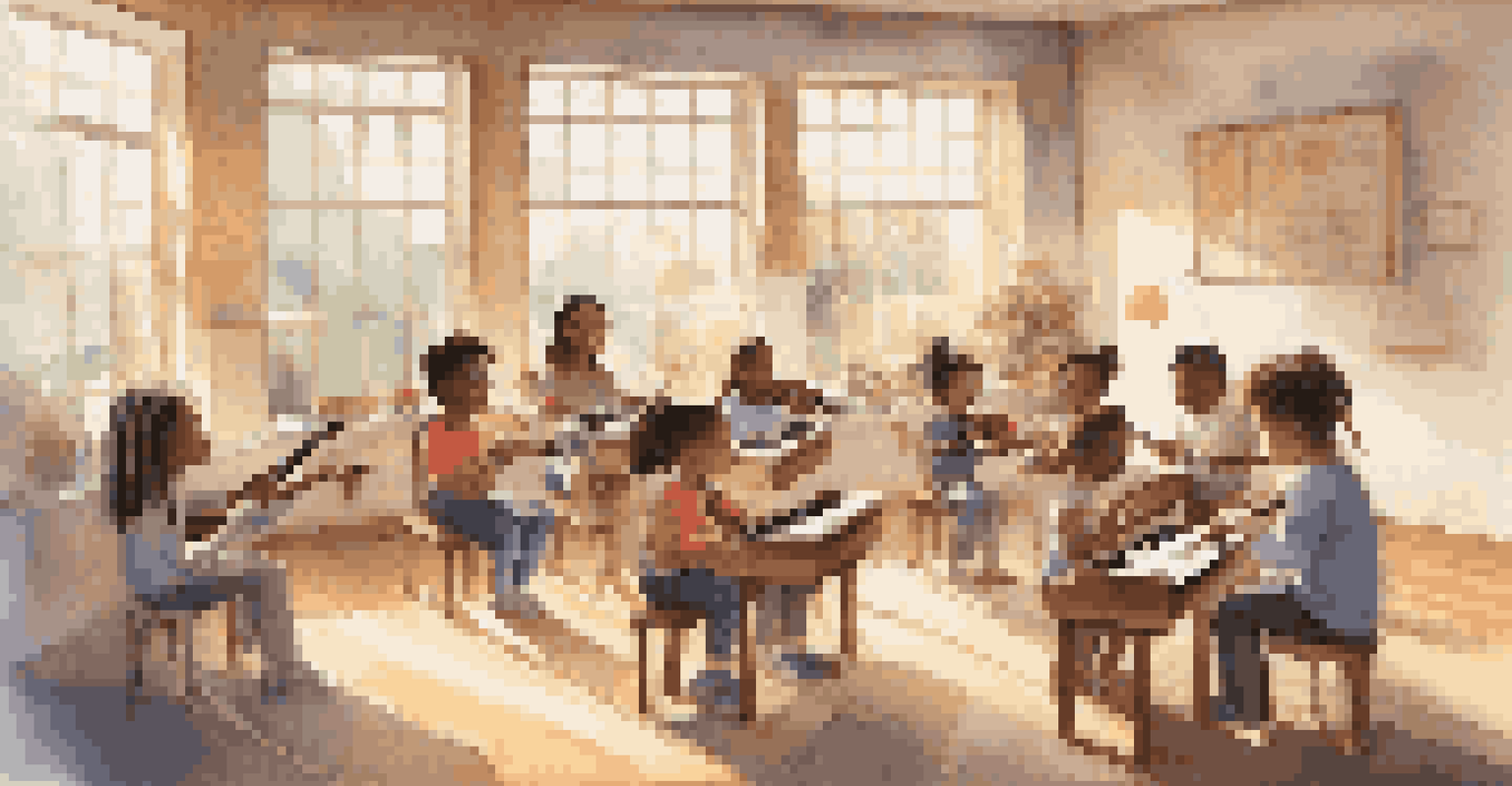The Role of Music in Enhancing School Climate and Culture

Music as a Tool for Building Community in Schools
Music has a unique ability to bring people together, creating a sense of community among students and staff. When students participate in musical activities, whether it's a choir, band, or even a casual jam session, they bond over shared experiences. This collective participation helps to break down social barriers and encourages inclusivity, making everyone feel valued.
Music can change the world because it can change people.
Furthermore, music programs can serve as a common ground for students from diverse backgrounds. For instance, students from different cultures can share their musical traditions, fostering appreciation and respect for one another. This exchange not only enriches the school’s culture but also promotes a sense of belonging.
In essence, music acts as a social glue, enhancing relationships within the school community. By participating in music-related activities, students develop friendships and connections that contribute to a supportive and welcoming atmosphere.
Enhancing Emotional Well-being Through Music
Music has a profound impact on our emotions, and this is especially true for students navigating the ups and downs of school life. Engaging with music—whether through listening, performing, or composing—can serve as an emotional outlet for students. It allows them to express their feelings and cope with stress, leading to improved mental well-being.

For example, studies have shown that students involved in music programs often report lower levels of anxiety and depression. The rhythm and melodies can soothe nerves and create a calming environment in an otherwise hectic school day. This emotional release can lead to a more focused and productive learning atmosphere.
Music Builds Community in Schools
Participating in musical activities fosters bonds among students, breaking down social barriers and encouraging inclusivity.
Moreover, when schools incorporate music into their daily routines—like playing uplifting songs during transitions or having music during lunch—students are likely to feel happier and more engaged. This positive emotional climate fosters a supportive school culture where everyone can thrive.
Music and Academic Performance: A Strong Connection
Research has consistently shown a correlation between music education and improved academic performance. Learning to play an instrument, for instance, enhances cognitive skills like memory and concentration, skills that are transferable to other subjects. This connection not only boosts grades but also reinforces the idea that music is an essential part of a well-rounded education.
Where words fail, music speaks.
In classrooms where music is integrated into the curriculum, students often demonstrate greater engagement and enthusiasm for learning. For example, using songs to teach math concepts can make the subject more relatable and enjoyable. This innovative approach not only improves understanding but also encourages creativity.
Ultimately, when students succeed academically, it contributes to a positive school climate. Improved performance leads to higher self-esteem and motivation, creating a cycle where students feel empowered and inspired to achieve their best.
Fostering Inclusivity: Music as a Universal Language
One of the most beautiful aspects of music is its ability to transcend language barriers, making it a universal form of expression. In a diverse school environment, music can bridge gaps between students from different backgrounds, promoting understanding and acceptance. This inclusivity lays the foundation for a harmonious school culture.
For instance, organizing multicultural music events allows students to showcase their heritage while learning about others. These events not only celebrate diversity but also encourage collaboration among students. When everyone’s voice is valued, it reinforces a strong sense of community.
Music Enhances Emotional Well-being
Engaging with music provides students an emotional outlet, helping them cope with stress and improving their mental health.
By embracing music as a universal language, schools can create an environment where differences are celebrated rather than shunned. This acceptance fosters a supportive atmosphere where every student feels they belong, enhancing the overall school climate.
Creating a Positive Environment with School Events
School events centered around music, like concerts and talent shows, play a crucial role in building a positive school culture. These gatherings not only showcase student talents but also strengthen community ties among students, parents, and teachers. Such events create an atmosphere of celebration and unity.
Moreover, these musical events encourage participation from students who may not typically be involved in extracurricular activities. When students see their peers performing and expressing themselves, it inspires them to engage, further enriching the school’s culture. This sense of involvement fosters pride and a feeling of belonging.
In essence, music-filled events provide memorable experiences that contribute to a vibrant school culture. They create an environment where students feel excited to share their talents and connect with one another, ultimately enhancing school spirit.
The Role of Music in Conflict Resolution
Music can serve as a powerful tool for conflict resolution within schools. When tensions arise, music can provide a means to facilitate communication and understanding. For instance, using songs to express feelings during mediation can help students articulate their emotions in a constructive way.
Additionally, music encourages teamwork and collaboration, essential skills in resolving disputes. Group music-making activities require students to listen to each other and work together, fostering a sense of camaraderie. This collaborative spirit can translate into improved relationships and a more peaceful school environment.
Music Boosts Academic Performance
Research shows that music education enhances cognitive skills, leading to better engagement and higher academic achievements.
By incorporating music into conflict resolution strategies, schools can promote empathy and respect among students. This proactive approach not only addresses conflicts as they arise but also cultivates a culture of understanding and cooperation.
Encouraging Lifelong Skills Through Music Education
Music education equips students with lifelong skills that extend beyond the classroom. Skills such as discipline, perseverance, and teamwork are cultivated through music practice and performance. These attributes are invaluable in various aspects of life, from personal growth to future career opportunities.
For example, students involved in music often develop a strong work ethic as they learn to practice and improve their craft. This dedication translates into other areas, helping them tackle challenges with resilience. Moreover, the collaborative nature of music teaches students the importance of working together towards common goals.

Ultimately, the skills acquired through music education contribute to a positive school climate. When students are empowered with these abilities, they approach their education with confidence and enthusiasm, fostering an environment where everyone can succeed.